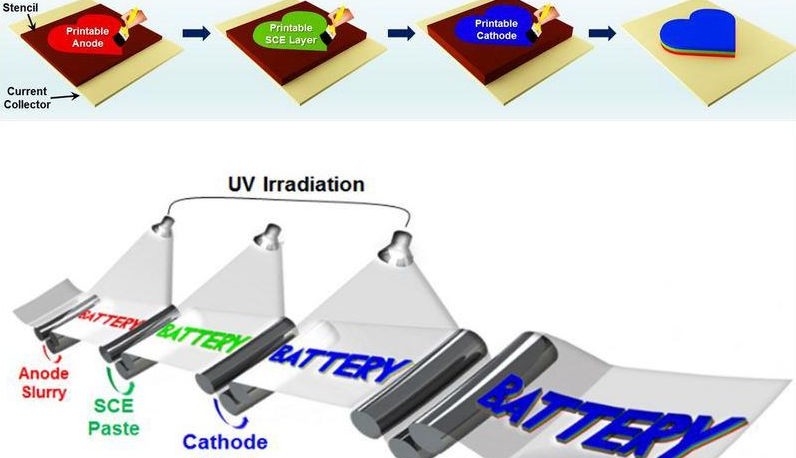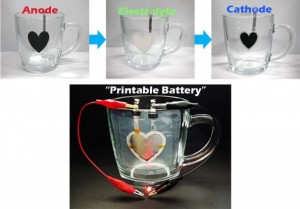Let’s stencil that Li-ion battery
September 05, 2016
on
on

Using a simple stencil printing process followed by ultraviolet cross-linking, researchers from the Ulsan National Institute of Science and Technology (UNIST, South Korea) have demonstrated a new type of Printable Solid-State (PRISS) Lithium-ion batteries designed through successive layers of curable composite materials.
The PRISS Batteries consist of a solid-state composite electrolyte (SCE) layer and SCE matrix-embedded electrodes, which can be printed on just about any object of any shape, as it is possible with today's stencil process. The researchers successfully tuned the rheological properties of the SCE paste and electrode slurry to give them thixotropic fluid characteristics suitable for complex deposition patterns on non-flat objects. They also had to design a high boiling point electrolyte to make the PRISS batteries compatible with heat curing.
 Circumventing solvent-drying and liquid-electrolyte injection process steps, while removing the need for conventional microporous separator membranes, makes the printable batteries truly shape-conformable.
Circumventing solvent-drying and liquid-electrolyte injection process steps, while removing the need for conventional microporous separator membranes, makes the printable batteries truly shape-conformable.
The research publication is entitled “Printable Solid-State Lithium-Ion Batteries: A New Route toward Shape-Conformable Power Sources with Aesthetic Versatility for Flexible Electronics”. One example it suggests is the integration of the PRISS batteries directly onto smart glasses frames.
The PRISS Batteries consist of a solid-state composite electrolyte (SCE) layer and SCE matrix-embedded electrodes, which can be printed on just about any object of any shape, as it is possible with today's stencil process. The researchers successfully tuned the rheological properties of the SCE paste and electrode slurry to give them thixotropic fluid characteristics suitable for complex deposition patterns on non-flat objects. They also had to design a high boiling point electrolyte to make the PRISS batteries compatible with heat curing.
 Circumventing solvent-drying and liquid-electrolyte injection process steps, while removing the need for conventional microporous separator membranes, makes the printable batteries truly shape-conformable.
Circumventing solvent-drying and liquid-electrolyte injection process steps, while removing the need for conventional microporous separator membranes, makes the printable batteries truly shape-conformable.The research publication is entitled “Printable Solid-State Lithium-Ion Batteries: A New Route toward Shape-Conformable Power Sources with Aesthetic Versatility for Flexible Electronics”. One example it suggests is the integration of the PRISS batteries directly onto smart glasses frames.
Read full article
Hide full article


Discussion (0 comments)